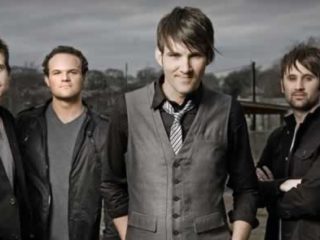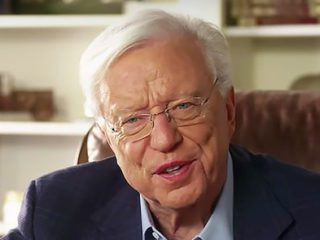For Chris Tomlin, 2006 has been the kind of year most artists dream about: he watched his Arriving (sixsteps) CD go gold, selling more than 500,000 copies (a rarity for a worship record) and won an armful of Dove Awards, topped by “Artist of the Year” and “Song of the Year.” Not bad for a guy who, weaned on country music, learned to play guitar by listening to Willie Nelson records.
“I know that it’s nothing I’ve done,” says the native of Grand Saline, Texas (located about 60 miles east of Dallas). “This wasn’t in the plan; I didn’t strive to make it happen. I don’t call churches and ask if they play my songs.”
A career as a worship leader wasn’t part of the plan, either, Chris explains. “I thought I was going to be a physical therapist, or maybe go into sports medicine.”
His path toward the Christian music industry may actually have begun at Amy Grant’s front gate. “I was just out of high school and trying to figure out where I wanted to go to college, and I and my buddies took a road trip to Nashville. Amy Grant was my favorite artist, and I found out where her house was. And we drove out there.
“They had an intercom system, and we rang the intercom. She answered, and we were like, ‘Oh, dang!’ [laughs] We didn’t know what to say. She actually talked to us for a minute.” Chris decided to write a song for her, bought a tape recorder and a tape at a nearby drug store and left the tape for her. “I asked her about it later; she doesn’t have the tape anymore-probably never got it. You look back and think, ‘Gosh, I was such a dork!'”
Close. I remember Chris as a slightly over-energetic college student several years behind me at Texas A&M in the early ’90s. There, we were both involved in a growing Bible study called “Breakaway.” It was modeled on a similar study at nearby Baylor University, led by a young, but very passionate, college pastor named Louie Giglio.
“I had started leading worship some around Texas,” says Chris. “I didn’t even know then it was called ‘leading worship.’ I’d just written some song that people were singing. Right when I got [to A&M as a transfer student], I heard about Breakaway.” The study, begun as a small group of 10 to 12 students meeting in an apartment near campus, grew into a group of hundreds (and, later, thousands), crowding into any space that would hold its swelling numbers.
“It was meeting in a library then, and it was growing. It was a really exciting time. A guy named Gregg Matte was speaking; he’s now pastor at First Baptist Church, Houston. I went up to him one week after Breakaway and said, ‘Hey, I’d love to help out with music.’ I know people did that all the time, and he totally blew me off.” But only until Chris and Matte led a retreat together in Dallas. “He spoke, and I did music,” recalls Chris. “I think it was like a hay ride [laughs]. [Afterwards], he came up and asked why I wasn’t doing music at Breakaway. I said, ‘Hey, I asked.'”
Chris ended up leading worship there from 1993-1995.
“My first impression of Chris as a college student was a joyful and sincere guy,” says Matte. “His heart was big for people and always ready to help. None of us, including Chris, could imagine all that God had planned. But Chris was a willing and useable vessel.”
After graduating, Chris went to work for Dawson McAllister’s ministry, then landed at a church in The Woodlands, Texas, north of Houston. “I started leading [worship] at the Harvest service at [The] Woodlands Methodist church, which was more of an outreach service to the community. The Woodlands became a good place to travel out of, belong to a community. My main life was traveling on my own and doing my own ministry.”
Chris stayed there for five years, playing 150 dates a year and also doing another one-year stint at Breakaway, which, by then, was meeting in A&M’s new basketball arena, the only venue that would hold it.
The first song that hinted at what was to come was one he penned at a camp with Louie Giglio: “We Fall Down.” “That would’ve been around 1995,” says Chris. “I wrote it just for the folks at the camp to sing around what [Louie] was talking about.” In reality, Chris wrote a song that would find a home in churches all over the world. And Giglio would go on to become his mentor and record label chief.
Copyright © 2006 CCM Magazine, Used by Permission
Like what you’re reading?
Get the full scoop by subscribing to CCM today! Click Here











